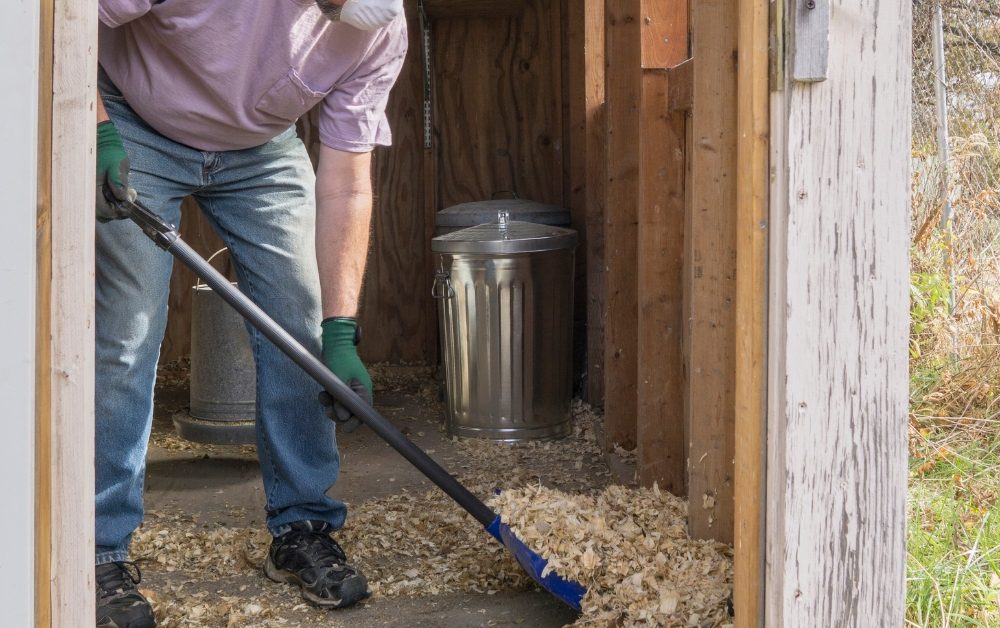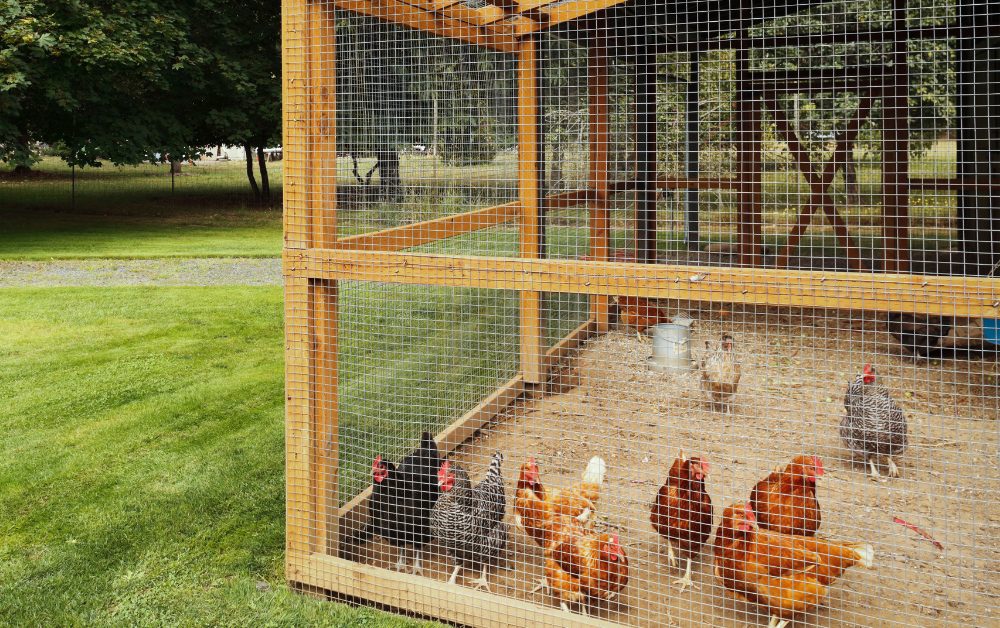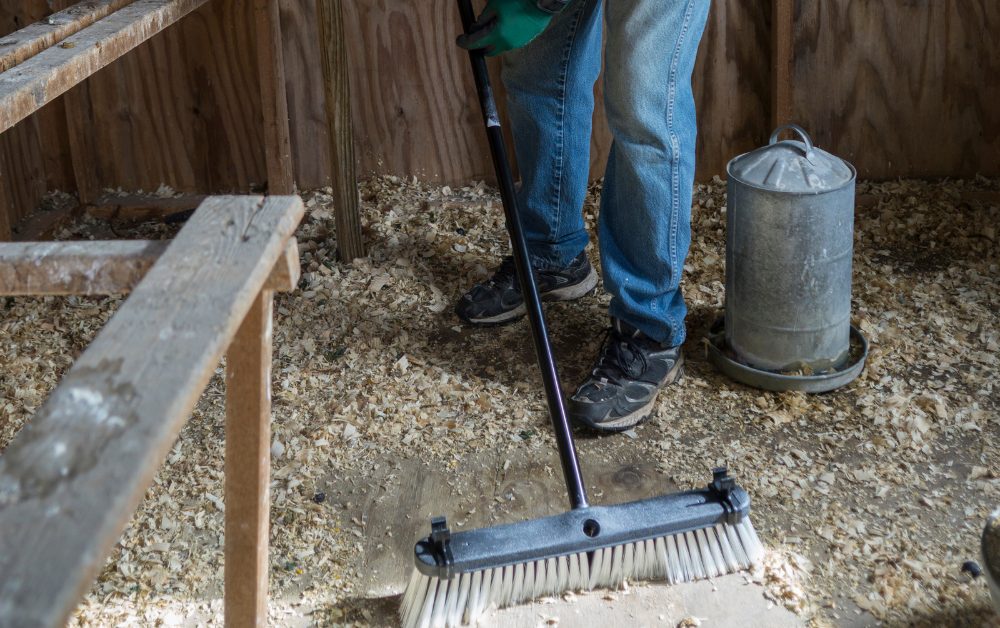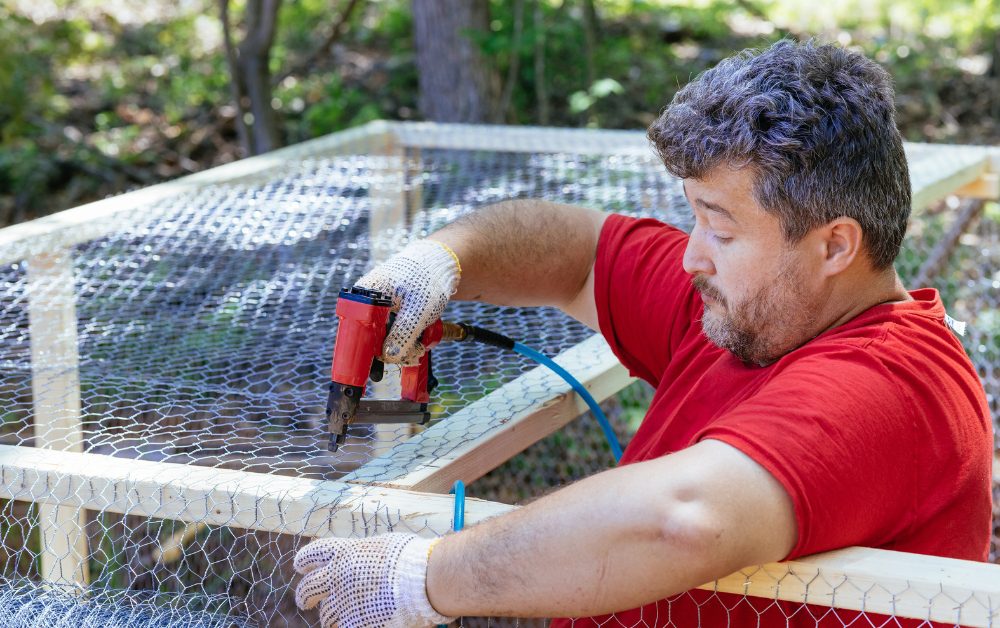Get the week's most popular posts delivered to your inbox.
Our weekly update is free yet priceless and you're less than a minute away from getting the current edition.
In the unlikely event we disappoint, you can unsubscribe with a single click!
Last Updated on September 12, 2025 by teamobn
If you have a passion for poultry and want to ensure the well-being of your flock, you’re in the right spot. Maintaining a clean and well-kept chicken coop is essential to ensure the health and happiness of your cherished feathered companions.
This article explores the best practices for chicken coop cleaning and maintenance for a happy and rewarding feathered journey.
Contents
The Significance of Chicken Coop Cleaning and Maintenance
Keeping your chicken coop clean is not just about aesthetics; it’s essential for your chickens’ health and egg production. Dirty coops can lead to disease, discomfort, and reduced egg-laying.
Safeguarding Chicken Health
Disease Mitigation
A clean coop serves as an impervious shield against potential diseases that thrive in unclean environments. Inadequate cleanliness in coops provides a haven for harmful microorganisms, such as bacteria, viruses, and parasitic invaders. These unwanted invaders pose a significant risk to the health of your chickens. Neglecting proper cleanliness can result in a variety of avian illnesses, including respiratory infections, coccidiosis, and even more severe conditions like Salmonella.
By upholding cleanliness as a non-negotiable standard, you minimize the risk of these insidious maladies and ensure that your chickens flourish in an environment brimming with health.
Cultivating Comfort
Just as humans thrive in immaculate, hygienic surroundings, chickens too revel in the pristine. Dirty coop ushers in discomfort for your feathered friends, making it challenging for them to roost, lay eggs, or engage in their daily routines. Impeccable cleanliness translates into a haven of comfort, reducing the likelihood of distress and upheaval among your chickens, and nurturing their holistic well-being.
Fostering Egg Production
Elevating Egg Quality
The link between a clean coop and superior egg quality is irrefutable. The accumulation of waste materials within a coop can taint the eggs, rendering them less hygienic and more cumbersome to handle.
Additionally, chickens that dwell in a pristine environment are more inclined to lay eggs of impeccable cleanliness, resulting in a product that is not only aesthetically pleasing but also practical for consumers and producers alike.
Amplifying Egg Output
A harmonious environment, free from the shackles of dirt and disorder, has a profound effect on egg-laying consistency. When chickens dwell in a clean, comfortable abode, they feel secure and content, which, in turn, stimulates them to maintain a regular laying pattern.
The reduction in stress and discomfort that clean coops bring about serves as an invitation to your chickens to express their full reproductive potential, ultimately translating into a more bountiful harvest of fresh, wholesome eggs.
The Best Practices
Regular Cleaning Schedule
Set a regular cleaning schedule – typically, every 1-2 weeks, depending on your flock’s size and the coop’s cleanliness. Establishing a consistent and well-structured chicken coop cleaning schedule coop is not just a routine task but an essential practice for ensuring the health, comfort, and productivity of your beloved feathered companions.
The current condition of your chicken coop is another pivotal factor in deciding the frequency of your cleaning sessions. If you have been diligent in your ongoing maintenance efforts and your coop remains relatively free from waste, soiled bedding, and other debris, a bi-weekly chicken coop cleaning routine is typically suitable.
Deep Cleaning
At least once a year, conduct a deep cleaning. This involves removing all chickens, and bedding, and thoroughly scrubbing and disinfecting every surface within the coop. Go through all the walls, ceilings, floors, roosts, nesting boxes, and any other fixtures or surfaces.
Employing a blend of water and a disinfectant safe for poultry, diligently cleanse every surface to eliminate all signs of dirt, dust, and any gathered waste. Give particular care to corners, crevices, and other spots that tend to accumulate debris. The process of disinfecting the coop is essential in eradicating harmful pathogens, and fostering a clean and healthful environment free from diseases.
Pest Control
Maintain vigilance against pests such as mites and rodents, as they can inflict harm on your chickens and disturb the cleanliness of the coop. Staying watchful for these intruders is a vital aspect of chicken coop upkeep.
These intruders not only put the health and welfare of your chickens at risk but can also disrupt the cleanliness and serenity of your coop. By staying proactive in pest control, you create a safer and more comfortable environment for your cherished feathered companions.
The Mite Menace
Mites, microscopic parasites that infest your chickens’ feathers and skin, can cause a range of health issues. They irritate and stress your chickens, potentially leading to feather loss, anemia, and a decline in egg production. Severe infestations can result in diseases like scaly leg mites, which cause discomfort and suffering.
Egg Quality
Mites can also affect egg quality. They may infest nesting boxes and contaminate eggs, making them less appealing for consumption and challenging to market.
Cleanliness Compromise
Mites thrive in the hidden recesses of your coop, making it challenging to maintain cleanliness. Their presence can result in soiled bedding, as chickens try to rid themselves of these irritating pests, contributing to a messier environment.
The Rodent Problem
Rodents like rats and mice are not only carriers of diseases but can also disrupt the peace and comfort of your coop. They often eat chicken feed, creating a scarcity that causes stress and malnutrition among your chickens.
Structural Damage
Rodents can gnaw through coop walls, weakening the structure over time. They often burrow into soft wood or nest in the bedding, which compromises the safety and durability of the coop. In severe cases, they can damage critical components like support beams or wiring if your coop has electrical features. This not only creates costly repair needs but also presents safety hazards for your chickens. Regular chicken coop cleaning can help identify early signs of rodent activity before they cause significant structural harm.
Waste Accumulation
Rodents leave behind droppings, which quickly build up and contribute to an unsanitary environment. Their waste can mix with the bedding, making it harder to maintain a clean and healthy space for your chickens. If not addressed promptly, it can undermine your chicken coop cleaning routine, increasing the chances of disease and contamination. Consistent cleaning and vigilance are key to keeping rodent waste from becoming an ongoing problem.
So, at the first sign of a mite or rodent problem, take immediate action. Isolate affected chickens, clean and treat the coop, and invest in traps or professional pest control services if needed. Take proactive steps to prevent infestations. This includes using safe and effective pest control methods such as dust baths, diatomaceous earth, and rodent-proofing your coop.
The Healthy Flock
Bedding Matters
The type of bedding you use can affect cleanliness and your chickens’ comfort. Options include straw, wood shavings, or sand. Choose one that suits your coop and is easy to clean.
Ventilation
Ensure proper ventilation in your coop. Adequate airflow helps control moisture, prevents the buildup of ammonia, and maintains a healthy environment.
Water and Feeding Areas
Keep water and feeding areas clean. Dirty food and water containers can attract pests and spread diseases.
The Fresh Coop
Cleaning Steps
When it’s time for chicken coop cleaning, move chickens first to a temporary area. Then, remove all bedding and waste. Scrub the coop’s surfaces with a disinfectant. Replace bedding and provide fresh water and food.
Repairs and Maintenance
Regularly inspect the coop for signs of damage. Fix any damaged areas promptly to prevent further issues. The structural integrity of your coop is paramount when it comes to the well-being of your chickens.
Any compromised areas, such as weakened or rotted wood, damaged hardware, or holes in the structure, can pose serious safety hazards. Coop damage may lead to accidents, injuries, or escape, exposing your chickens to hazards.
The Wrap Up
In the world of poultry keeping, chicken coop cleaning and maintenance is a labour of love. Indeed, it creates a haven for your feathered friends. A clean and well-maintained coop will not only keep your chickens happy but also reward you with fresh, healthy eggs and a sense of accomplishment.
Maintaining a chicken coop may require some effort, but the rewards of a thriving and content flock are well worth it. So, start your journey towards a cleaner, healthier coop today, and your chickens will cluck their thanks for years to come.
Frequently Asked Questions
1. Why is regular chicken coop cleaning essential?
Regular chicken coop cleaning is vital for maintaining a healthy and comfortable environment for your chickens. It helps prevent diseases, ensures optimal egg production, and promotes overall well-being.
2. Are there seasonal considerations for chicken coop cleaning and maintenance?
Yes, wetter seasons may require more frequent chicken coop cleaning due to muddier conditions. Adapting your schedule to account for seasonal changes is important.
3. Are there eco-friendly and natural cleaning options for chicken coops?
Yes, you can use natural solutions like vinegar and water. They are safe for chicken coop cleaning and do not leave harmful residues.
Get the week's most popular posts delivered to your inbox.
Our weekly update is free yet priceless and you're less than a minute away from getting the current edition.
In the unlikely event we disappoint, you can unsubscribe with a single click!






